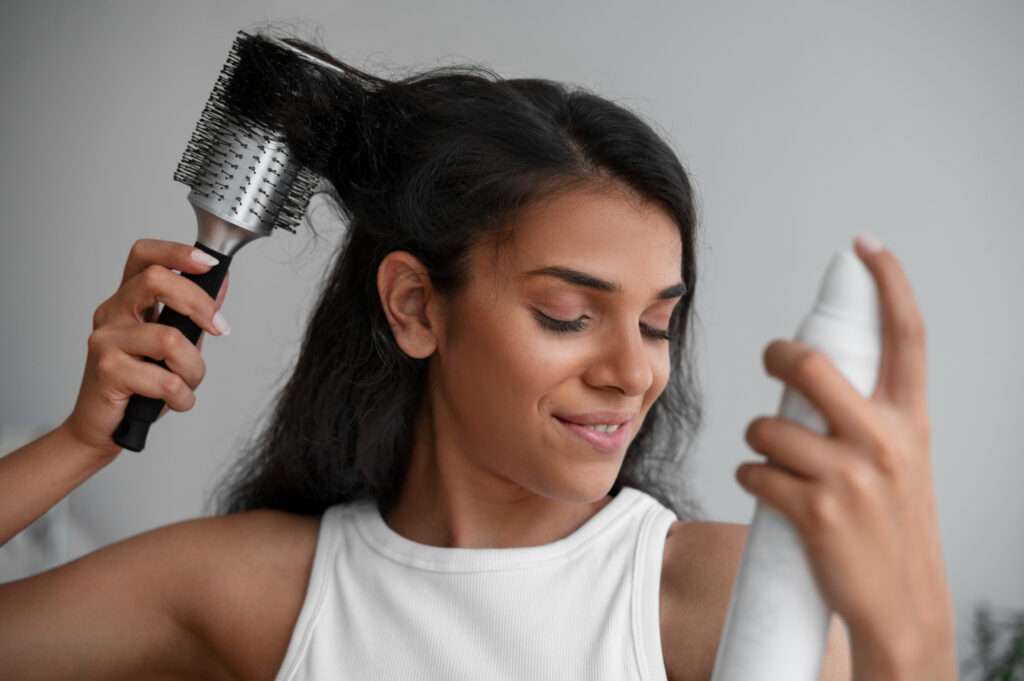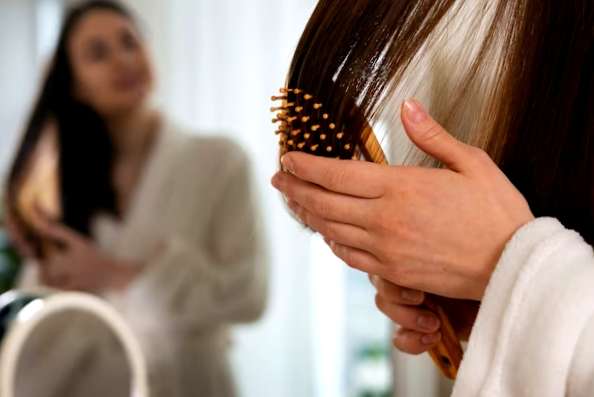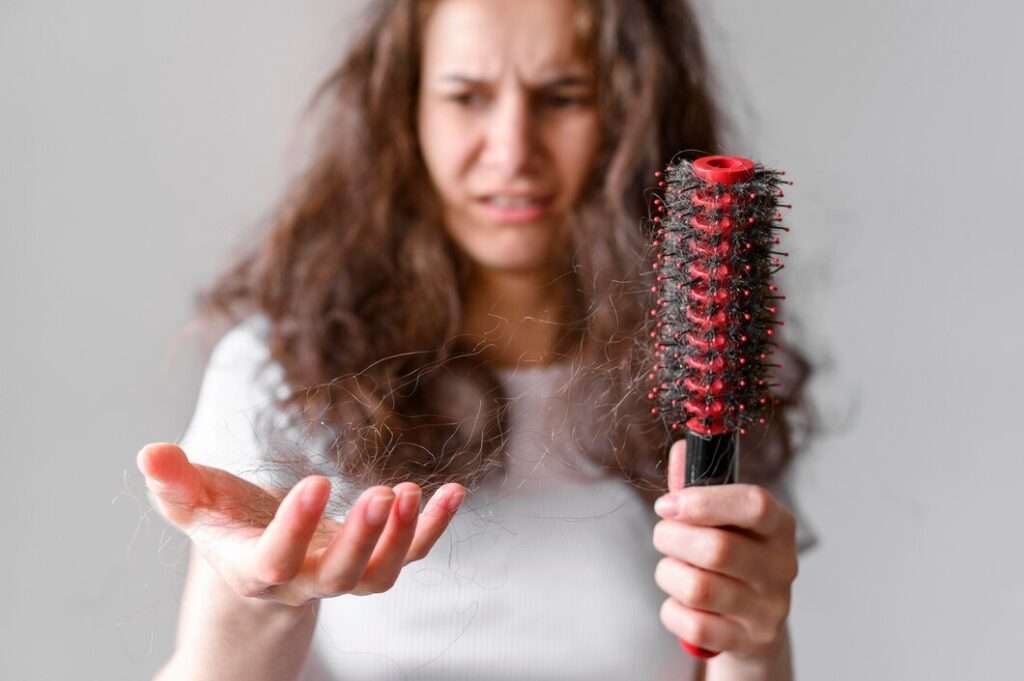Table of Contents
Hair loss is a common worry that can affect how we feel about ourselves. When we talk about how to grow hair faster, it’s important to be realistic. Hair doesn’t suddenly grow overnight, but with some natural tricks, we can help it along.
In this article, we’ll focus on stopping hair loss and encouraging healthy growth using simple, natural methods. Let’s explore some easy things you can do that might make a difference in just one week and you can see your hair grow in no time. With these tips, you can give your hair the care it needs to look and feel its best.

Hair Fall Stages:
Anagen (Growth):
This is the active growth phase, lasting a few years. Picture your hair cells working hard, making your strands grow about half an inch each month. How long your hair gets depends on how long anagen lasts – it’s like the engine room of hair growth.
Catagen (Transition):
After anagen, there’s a short transition called catagen. It’s like a little break for your hair. Hair follicles shrink, and strands take a pause before moving on. This stage only lasts a few weeks, a quick pit stop in the hair growth journey.
Telogen (Resting and Shedding):
The resting phase where hair is no longer actively growing. Shedding occurs during telogen, and new hair starts forming. This phase can last a few months, and around 10-15% of your hair is in telogen at any given time.
Disruptions in this hair growth cycle, leading to more hair fall, can happen due to stress, hormonal changes (like during pregnancy or menopause), not getting enough nutrients, or certain health issues (like thyroid problems). Knowing about these stages is like having a roadmap to tackle hair fall and keep your hair growth journey smooth.
5 Natural Ways To Grow Hair
1. Healthy Diet:
A nourishing diet is a fundamental factor in promoting the growth of healthy and vibrant hair. For optimal hair health, it’s essential to consume a balanced diet rich in protein, vitamins, and minerals. Protein serves as the building block for hair, aiding in its strength and helps to grow hair. Key nutrients like biotin, iron, and vitamins A, C, and E play crucial roles in supporting hair growth, fortifying hair follicles, and maintaining a healthy scalp.

Include protein-rich foods such as lean meats, fish, eggs, dairy products, legumes, and nuts in your diet. Biotin, found in eggs, nuts, seeds, and whole grains, contributes to hair strength and growth. Iron, vital for hair health, is present in red meat, poultry, fish, beans, lentils, and spinach. Ensure an ample intake of vitamins A, C, and E by incorporating fruits and vegetables like carrots, sweet potatoes, citrus fruits, berries, bell peppers, and avocados into your meals.
While focusing on a diet that promotes hair growth is beneficial, individual nutritional needs can vary. It’s advisable to consult with a doctor or nutritionist for personalized advice, ensuring that you’re providing your body with the specific nutrients it needs to support not only the growth of your hair but also your overall well-being.
2. Scalp Care:
Having a healthy scalp is super important for growing strong hair. You can help your scalp by giving it gentle massages to boost blood flow and bring more nutrients to your hair roots, making them happy and promoting growth.

Using natural stuff like aloe vera or coconut oil on your scalp can be helpful too, but they’re not magic fixes. They’re like good snacks for your hair, giving it a little extra love.
If your scalp is acting up with things like dandruff or irritation, it’s best to see a dermatologist. They’re like superheroes for your scalp, figuring out what’s wrong and giving you the right treatments to fix it.
So, keep your scalp happy with gentle massages and some natural treats, but if things get tricky, let the superhero dermatologist save the day for your hair!
3. Gentle Hair Care:
Being gentle with your hair is crucial for nurturing its growth. When you treat your hair with care, it’s like creating the perfect environment for it to thrive and grow. To promote the growth of healthy hair, it’s essential to avoid harsh chemicals, excessive heat styling, and tight hairstyles that can cause damage and breakage. Instead, opt for gentle hair care practices that prioritize the well-being of your hair.

Start by using lukewarm water when washing your hair, as hot water can strip away natural oils and lead to dryness. Choose gentle shampoos and conditioners that nourish and protect your hair without harsh ingredients. Over-washing can also be detrimental to hair growth, so try to find a balance and avoid washing too frequently.
When it comes to styling, opt for air-drying or using a diffuser on low heat instead of blow-drying, which can cause heat damage. This way, you’re minimizing stress on your hair and promoting its overall health and growth.
Additionally, consider incorporating deep conditioning treatments into your routine to provide your hair with extra moisture and strength. These treatments, enriched with natural ingredients, can help nourish your hair from root to tip, creating an optimal environment for healthy growth.
4. Stress Management:
Chronic stress can impact your hair growth by disrupting its natural cycle. Normally, hair goes through phases of growth, rest, and shedding. Prolonged stress can shift more hair into the shedding phase, leading to increased hair loss over time. Additionally, stress triggers inflammation, affecting the health of hair follicles and contributing to hair thinning.

To mitigate the impact of stress on hair, incorporating stress-reduction techniques is beneficial. Practices like meditation, involving focused attention and relaxation, and yoga, combining gentle movements with controlled breathing, have scientifically proven stress-relieving effects. Spending time in nature provides an added therapeutic benefit by reducing stress hormones.
In cases of persistent stress, seeking professional assistance, such as consulting a therapist or counselor, is an important step. These professionals uses evidence-based strategies to address the root causes of stress and provide coping mechanisms. By managing stress effectively, not only are mental well-being and overall health enhanced, but the conducive environment for optimal hair growth is also preserved. It’s a holistic approach that recognizes the interconnectedness of mental health and hair vitality.
5. Healthy Habits:
Incorporating healthy habits into your lifestyle is key for both your overall well-being and the health of your hair. Adequate sleep, staying hydrated, and regular exercise are essential pillars of a healthy lifestyle that directly impact hair health.

Firstly, getting enough sleep is crucial as it allows your body to repair and regenerate, including your hair follicles. During sleep, your body produces essential hormones and proteins that support hair growth and repair.
Staying hydrated is equally important as it helps maintain the optimal functioning of your body’s systems, including those responsible for hair growth. Drinking enough water ensures that your scalp and hair follicles receive adequate moisture, promoting healthy hair growth.
Regular exercise not only benefits your physical and mental health but also promotes circulation, delivering oxygen and nutrients to your scalp and hair follicles. Improved circulation encourages hair growth and contributes to overall hair health.
It’s also important to manage any underlying health conditions that may impact hair growth, such as thyroid issues. Conditions like hypothyroidism or hyperthyroidism can disrupt the balance of hormones in your body, leading to hair thinning or loss. Seeking proper treatment and management of these conditions is essential for maintaining healthy hair growth.
By prioritizing these healthy habits and addressing any underlying health concerns, you’re not only enhancing your overall health but also creating a favorable environment for strong, vibrant hair.
What Affects Hair Growth?
Hair growth can be influenced by various factors, and understanding these aspects provides insight into maintaining optimal hair health. Here’s a brief overview:
Genetics:
Your family tree plays a significant role in determining your hair’s growth patterns. If your parents or grandparents experienced certain hair characteristics, you might too.
Age:
As you age, hair growth tends to slow down. Hair strands may become finer, and the growth cycle may become shorter, leading to less robust growth.
Medical Conditions:
Certain health issues can impact hair growth. Conditions like alopecia, thyroid disorders, and autoimmune diseases can contribute to hair loss.
Medications:
Some medications, such as chemotherapy drugs, anticoagulants, or certain antidepressants, can affect hair growth. It’s essential to be aware of potential side effects.
Hormonal Changes:
Significant hormonal shifts, such as during pregnancy, childbirth, or menopause, can influence the hair growth cycle. Hormonal imbalances may lead to temporary or prolonged changes in hair thickness and texture.
Environmental Factors:
External elements like sun exposure and pollution can impact hair health. UV rays from the sun can damage hair structure, and exposure to pollutants can contribute to scalp issues.
Understanding these factors allows individuals to make informed choices about their hair care routines and seek appropriate solutions if they notice changes in hair growth patterns.
Prevent Hair Fall:
preventing hair loss involves adopting a comprehensive approach. Here are additional tips to complement your efforts:
Avoiding Tightly Pulled Hairstyles:
Tight hairstyles like ponytails, braids, or buns can exert stress on the hair shaft and lead to breakage or traction alopecia. Opt for looser styles to minimize tension on your hair.
Protecting Hair from Sun Damage:
Prolonged exposure to UV rays can weaken hair strands. Consider wearing a hat or using protective products with UV filters when spending extended periods in the sun.
Getting Regular Trims:
Regular trims help maintain the health of your hair by preventing split ends from traveling up the hair shaft. Aim for a trim every 6-8 weeks to keep your hair ends fresh and prevent breakage.
Managing Stress:
Chronic stress can contribute to hair loss. Incorporate stress management techniques into your routine, such as meditation, yoga, or deep breathing exercises, to promote overall well-being and support healthy hair growth.
Balanced Diet:
Ensure your diet includes essential nutrients like vitamins, minerals, and proteins. These nutrients are vital for healthy hair growth. Foods rich in biotin, iron, and omega-3 fatty acids can contribute to strong and resilient hair.
Gentle Hair Care:
Treat your hair gently during washing and drying. Use a wide-toothed comb to detangle wet hair, avoid excessive heat styling, and choose sulfate-free and gentle hair care products.
By integrating these tips into your hair care routine, you’re taking proactive measures to prevent hair loss and promote the overall health and resilience of your hair.
Conclusion:
To sum it up, taking care of your hair involves using natural methods like a good diet, gentle care, and stress relief. But remember, these aren’t magic fixes; they just help your hair be healthy.
If you’re worried about hair loss or if things aren’t getting better, it’s smart to talk to a doctor or a skin expert (dermatologist). They can figure out what’s going on and give you the right advice. Your hair is unique, so getting professional help ensures you’re on the right track for happy and healthy hair. Just be patient, consistent, and reach out for expert guidance when needed.
FAQs:
1. How to grow hair faster in a week?
Hair doesn’t really grow super fast in just a week. But if you want it to be healthy, eat good food, be gentle with your hair, and don’t use too much heat.
2. How to get thick hair?
To make your hair thicker, eat healthy stuff like fruits and veggies. Treat your hair nicely, don’t use too much heat, and drink water. That helps your hair become thicker and healthier.
3. How to grow hairs naturally?
Let your hair grow naturally by eating good food, being nice to your hair, and keeping stress away. No need for fancy stuff – just be kind to your hair.
4. What causes hair loss?
Losing hair can happen for different reasons, like family genes, getting older, or some medicines. If you’re losing hair and it bothers you, talk to a doctor. They can figure out why and help you out.

Pingback: 10 Celebrity Hair Care Secrets Revealed: Unlock Glowing Locks Like The Stars |